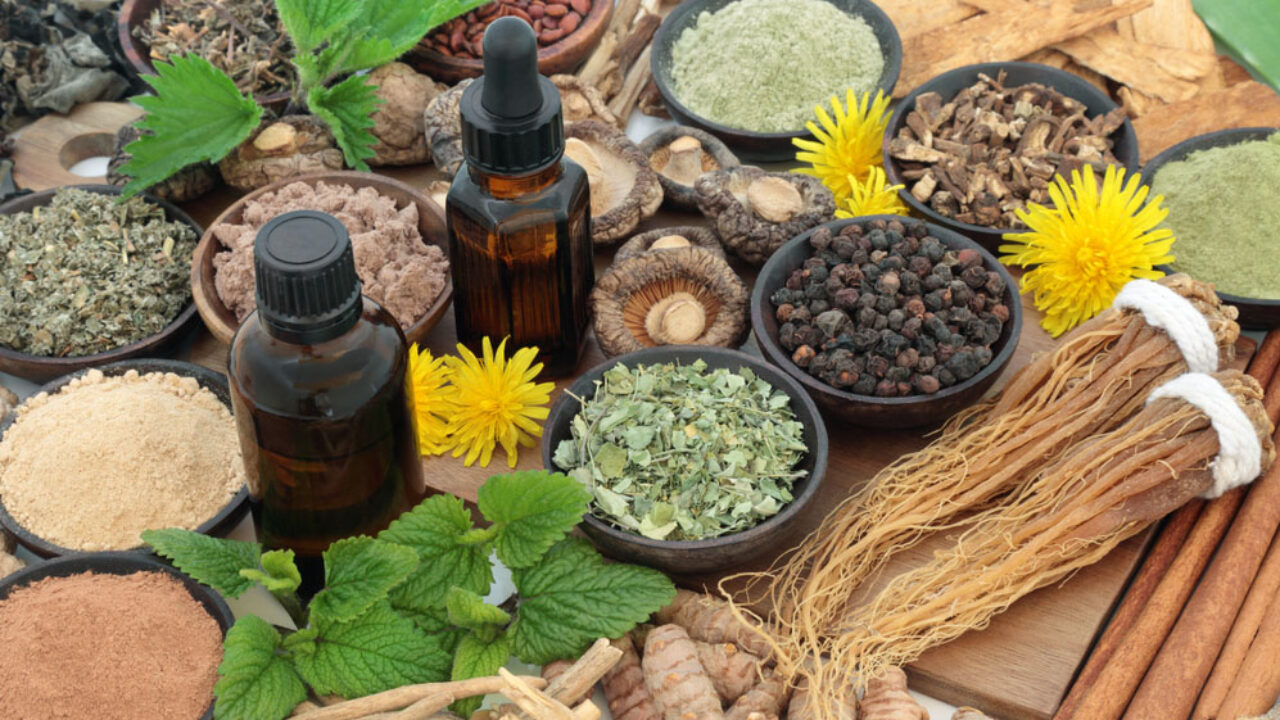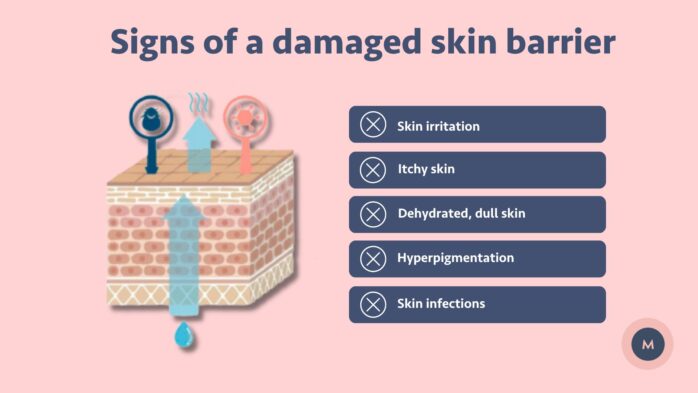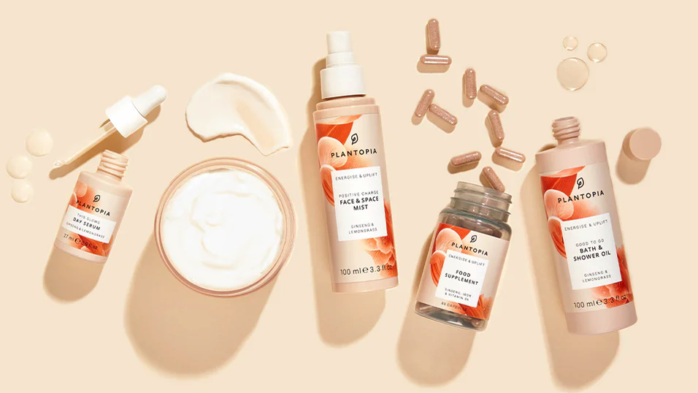
Adaptogenic skincare is on the rise, promising to improve your skin while reducing stress but what are adaptogens, and how do they work? The experts explain
JUMP TO SECTION
Click the links below to jump to the relevant section:
Adaptogens and adaptogenic skincare is the latest must-have skincare trend. There is an increasing number of sprays, creams, lotions, and supplements that use the plant-based ingredients in various ways and each one works to help our bodies deal with stress.
While adaptogens themselves aren’t new – they’ve been used in Chinese medicine and Ayurveda for centuries – their use in consumer skincare has seen searches for the ingredients rise over the past 12 months.
One of the forerunners of the consumer adaptogen skincare trend is Plantopia.
We spoke to Plantopia’s Brand Manager Grace Hearn, as well as Jennifer Hirsch, known as The Beauty Botanist, to discover more about what adaptogens are, what benefits they bring, and how they work.
 Shutterstock
Shutterstock The term ‘adaptogen’ was coined by Russian toxicologist Nikolay Lazarev in 1957 to refer to ‘substances that increase the state of non-specific resistance’ in stress. “Today,” said Hirsch, “the term is used to identify plants and mushrooms that have unique properties related to helping the body adapt to fight physical or mental stress and restore balance.”
According to Hearn, adaptogens work to reduce the negative reactions during our bodies’ “alarm” phase – the reaction our bodies initially have in response to stress – and eliminate, or at least decrease, the onset of the so-called “exhaustion phase”. By the exhaustion phase, our bodies can no longer cope with stress and this can cause high blood pressure, problems with the immune system, and more.
It should be noted that while all adaptogens come from plants and mushrooms, not all plants and mushrooms are adaptogens.
To be classed as an adaptogen, Hirsch explains that each one has to meet the Four N criteria. They must be:
The impact that adaptogens have in supplements is relatively clear – you ingest the adaptogens and they get to work bringing your body back into a state of balance or homeostasis. But how does applying a cream to your face reduce stress and unlock the benefits of adaptogens?
WHAT DO ADAPTOGENS DO?
Our bodies don’t exist in a static state; they are in a constant state of adjustment in the search for balance.
Adaptogens help to return our bodies back to a state of balance, what scientists call homeostasis.
To do this, the adaptogen increases or decreases chemical reactions within the body.
For example, stress elevates cortisol, so an adaptogen will work to reduce cortisol levels. Fatigue reduces cortisol, so an adaptogen will work to increase cortisol levels.
Firstly when you experience redness or irritation, for instance, it’s a sign that your skin is out of balance. Typically because your skin barrier has been damaged by oxidative stress.
When your body, and skin, are exposed to air pollution, cigarette smoke, pesticides, X-rays, and other external sources it causes your cells to metabolise, which creates what’s known as free radicals.
Free radicals are made up of an uneven number of electrons. Because electrons prefer to be in pairs, the rogue “free” electrons – i.e the electrons that don’t have a pair – try to balance the equation. To do this, they steal electrons from healthy molecules.
When an electron is taken from a pair, it turns the leftover electron into a free radical. This free radical then goes in search of a partner and the chain continues.
When our body and skin are in a state of balance, we have natural ways of keeping free radicals in check in the form of antioxidants.
Our cells naturally produce some antioxidants. We get other antioxidants from our diet, particularly from foods containing vitamins C and E, and plants are full of compounds known as phytochemicals, many of which have antioxidant properties.
However, when our body and skin are in a state of stress, or when we don’t get enough antioxidants from our diet or supplements, the free radicals can take over and break down cellular structures, including DNA and cell membranes. This causes oxidative stress and leads to redness, irritation, skin conditions such as atopic dermatitis, and premature ageing.
 Shutterstock/mamabella
Shutterstock/mamabella Adaptogens help handle stress by “simulating stress,” continued Hirsch, because with “the right training and with support, repeat exposure to stress makes us stronger and more resilient.”
In this way, you can think of adaptogens as personal trainers. Adaptogens train your body to increase its non-specific resistance to stress and decrease its sensitivity to it. This helps protect the body against stress by prolonging the resistance and thus the amount of stress a body can take before it’s exhausted. Helping us return our bodies to a state of balance.
“However, the balance achieved is not at the same level as the body started at,” added Hirsch. “Adaptogens help the body achieve a higher level of equilibrium or homeostasis. The higher the level of homeostasis, the better the body’s adaptation to stress, expressed as a stimulating and anti-fatigue effect.”
In this way, adaptogens help us handle stress without side effects by reducing anxiety, encouraging better sleep, improving immune resistance, boosting focus and concentration, supporting faster recovery, and promoting a feeling of well-being and better moods. “Basically, adaptogens improve our body’s fitness for resisting stress of all kinds,” said Hirsch.
What’s more, when applied topically “adaptogens can help the skin adapt better to stress symptoms such as redness and inflammation and support in the skin’s antioxidative systems, increase skin cells energy level and offer and promote skin tone and appearance,” added Hearn.
 Plantopia
Plantopia As specialists in this field, Plantopia sells a range of adaptogenic skincare and supplements. It pairs the adaptogens with essential oils and scents to create different benefits.
For example, its Detox and Purify range includes the adaptogen schisandra, known to help boost mental performance and fight stress, and elemi which helps increase focus and counter anxiety and negative thoughts.
The Rest & Sleep range combines the adaptogen ashwagandha with sandalwood to reduce anxiety and aid better sleep; Relax & Calm uses turmeric and geranium to relax the mind and body; and Energise & Uplift helps lift your mood and re-energise your skin, mind, and body with the use of ginseng and lemongrass.
 NEOM
NEOM We’ve used (and subsequently run out of) the Relax & Calm face mist and can vouch for its relaxing properties, while the Energise & Uplift serum is great for providing a natural glow.
Neom Organics recently launched its new adaptogen face mist, called Big Day Energy. It contains adaptogenic ginseng root and elf dock flower alongside ribose from corn seeds, and essential oils including rosemary, eucalyptus, patchouli, and lavender.
The brand promises that this formula – which can be spread over or under makeup – calms the mind and refreshes the skin.
Elsewhere, a newcomer on the adaptogenic skincare scene is SABI. The plant-based range combines adaptogens and prebiotics to help restore the skin’s natural microbiome and support hormonal balance. It sells face mist, serum, body moisturiser, and herbal infusions.
The brand was founded by Hilary Metcalfe and Anna Cave-Bigley who wanted to create a collection of products designed to help with female hormonal issues, from migraines and painful periods to infertility and postpartum depression.
We’re yet to try these products for ourselves, but the idea behind the brand sounds promising.
In addition to adaptogens in skincare, you can buy adaptogenic supplements too. To help from the inside out.
Adaptogenic Apothecary, for example, recently launched its range of Harmony elixirs.
Described as the “world’s first four-phase menstrual cycle supplement”, the herbal adaptogenic elixirs are taken throughout the 28 days of your menstrual cycle to restore the balance needed at the different stages.
Zooki, the global health brand that sells a range of supplements in easy-to-take pouches, sells an Ashwagandha Zooki sachet. It tastes like pink guava and each sachet contains 500mg of an Ashwagandha extract called KSM-66 which has been shown to lower stress, improve sleep and anxiety, and is great for balancing hormones.
Zooki claims its sachets are among the most effective on the market because of the way they “carry” the nutrients to your cells. This protects them from being destroyed and delivers more of the extract, and thus its benefits, to your system.
View this post on Instagram
Not related to adaptogens, but relevant to women’s hormones, we recently started taking a supplement called Aegle’s Acne Clear Now. It’s designed to target the hormonal causes of acne and breakouts in women and it’s made a huge difference. You can read more in our Aegle’s Acne Clear Now review.
It’s difficult to create a definitive adaptogens list because, as Hirsch told us: “As this area has exploded into the public consciousness, so the number of actives with personal care applications grows.
“Also, what we in the West are using in supplements and what is being used in China and India, where Traditional Chinese Medicine and Ayurveda are practiced, is quite different. These systems have used and recognised the value of adaptogens long before they were given that classification.”
However, the following adaptogens list includes some of the most common adaptogens, plus those which are probably/possibly adaptogens, but further clarification is needed:

Victoria is founder and editor-in-chief of mamabella, freelance journalist and Mum. She has a passion for empowering people to feel beautiful whatever their age, size, skin type and budget

